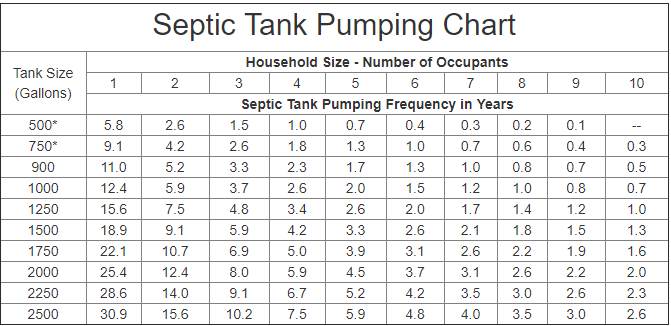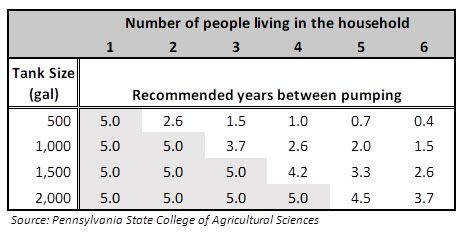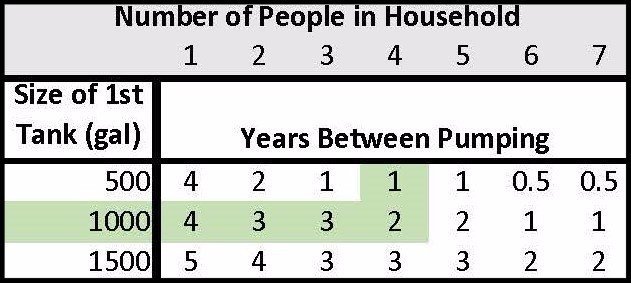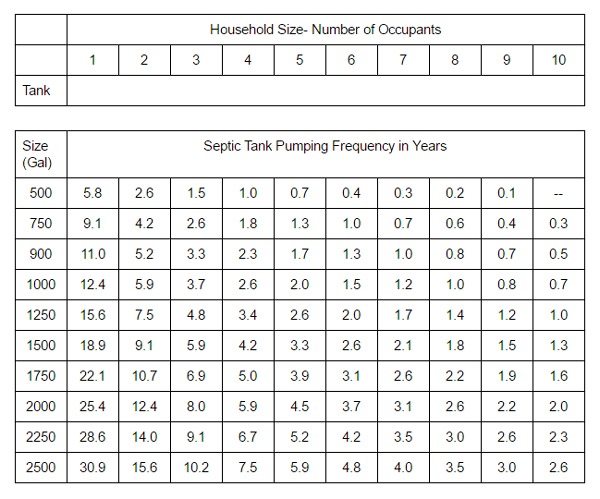In this article, we will discuss how often you should get your septic tank cleaned and understand the recommended pumping frequency. Maintaining a regular cleaning schedule is crucial to prevent costly repairs and avoid environmental contamination. We will explore the factors that influence the recommended pumping frequency and provide guidelines to help you determine the best schedule for your septic system. By the end, you will have a clear understanding of how often to get your septic tank cleaned to ensure its optimal functioning.
What is a Septic Tank?
A septic tank is an underground sewage treatment system that is commonly used in rural areas and homes that are not connected to a municipal sewer system. It is designed to efficiently and safely treat and dispose of wastewater from your home. The septic tank works by separating solid waste from water, allowing the water to flow into a drainage field or leach field where it is further treated by the soil. The solid waste, also known as sludge, is decomposed by bacteria in the tank over time.
Importance of Regular Maintenance
Regular maintenance of your septic tank is crucial to ensure its optimal functioning and to prevent costly repairs in the future. Neglecting maintenance can lead to clogs, backups, and even system failure, which can be unhygienic and pose health risks to you and your family. Regular maintenance involves inspecting and pumping the tank to remove accumulated sludge and prevent it from overflowing into your drainage field.
Factors Affecting Pumping Frequency
The frequency at which you need to pump your septic tank depends on several factors. Understanding these factors can help you determine how often you should schedule septic tank cleanings.
Tank Size
The size of your septic tank plays a crucial role in determining how frequently it needs to be pumped. Larger tanks have a higher capacity to hold sludge, which means they can go longer between cleanings compared to smaller tanks. If you’re unsure about the size of your septic tank, consult the original building plans or contact a professional for assistance.
Number of Household Members
The number of people living in your household affects the amount of wastewater generated and, consequently, the rate at which your septic tank fills up. As a general rule, the more people in your household, the more frequently you need to pump your septic tank. On average, a septic tank serving a family of four may need to be pumped every three to five years.
Water Usage
The amount of water your household uses also affects the frequency of septic tank pumping. Excessive water usage can overload the system and cause it to fill up faster. This includes activities such as doing laundry, taking long showers, or running the dishwasher frequently. It’s important to be mindful of your water usage and implement water conservation measures to reduce the strain on your septic system.
Septic System Design
The design and capacity of your septic system can also impact the pumping frequency. Some newer septic systems are equipped with additional components such as effluent filters or aerobic treatment units, which can prolong the time between cleanings. If you have a more advanced septic system, it’s advisable to consult with a professional to determine the appropriate pumping schedule.
Recommended Pumping Frequency Guidelines
While the factors mentioned above are important in determining septic tank cleaning frequency, it’s always best to follow the recommended guidelines provided by experts. The National Environmental Services Center (NESC) suggests the following general pumping frequency recommendations:
- Household of 1-2 people: Every 3-5 years
- Household of 3-4 people: Every 2-3 years
- Household of 5 or more people: Annually or every 1-2 years
Keep in mind that these guidelines are not set in stone, and it’s important to monitor your septic system regularly to determine if it needs cleaning sooner than recommended.

Signs That Your Septic Tank Needs Cleaning
In addition to following the recommended pumping frequency, it’s essential to be aware of certain signs that indicate your septic tank needs cleaning. Ignoring these signs can lead to serious problems and potential system failure. Look out for the following warning signs:
- Slow draining sinks, showers, or toilets
- Gurgling sounds in the plumbing system
- Foul odors emanating from drains or the area around the septic tank
- Sewage backups or standing water in the yard
- Lush, green patches of grass over the drainage field
- Increased frequency of plumbing issues, such as clogs or backups
If you notice any of these signs, it’s important to schedule a septic tank cleaning as soon as possible to prevent further damage.
Consequences of Neglecting Maintenance
Neglecting regular septic tank maintenance can have severe consequences for both your property and your health. Here are some of the potential issues that can arise from neglecting septic system maintenance:
-
System Failure: Over time, the accumulation of sludge can lead to clogs and backups, causing the septic system to fail. This can result in costly repairs or even the need for a complete system replacement.
-
Health Risks: A failing septic system can contaminate groundwater, wells, and nearby water bodies, posing a significant health risk to you and your community. Bacteria and viruses present in untreated wastewater can cause diseases such as hepatitis and gastrointestinal infections.
-
Property Damage: Backed-up sewage or overflowing septic tanks can cause extensive damage to your property, including unpleasant odors, water damage, and contamination. The costs of repairing such damage can be significant.
-
Decreased Property Value: Neglecting septic tank maintenance can negatively impact the value of your property. If you decide to sell your home in the future, a well-maintained septic system can be a selling point, while a neglected one can be a major red flag for potential buyers.
Given these potential consequences, it’s crucial to prioritize regular septic tank maintenance and cleaning.

Choosing a Professional Septic Tank Cleaning Service
When it comes to septic tank cleaning, it’s essential to hire a professional service to ensure the task is done correctly and efficiently. Here are some factors to consider when choosing a septic tank cleaning service:
Experience and Reputation
Look for a company that has a proven track record and extensive experience in the industry. A reputable service provider will have knowledgeable technicians who can assess the condition of your septic system and perform the necessary maintenance tasks.
Certifications and Licenses
Ensure that the service provider you choose holds the necessary certifications and licenses required by your local authorities. This ensures that they adhere to industry standards and regulations, guaranteeing the quality of their work.
Pricing and Contracts
Obtain quotes from different companies and compare their pricing structures. Make sure you understand the services included in the price and if they offer any service guarantees. Additionally, consider whether the company offers maintenance contracts, which can help ensure regular cleanings are scheduled.
Customer Reviews
Read customer reviews and testimonials to get an idea of the service quality and customer satisfaction levels. Consider asking for references from the service provider to get firsthand feedback from their previous clients.
DIY Septic Tank Cleaning Methods
While professional cleaning is recommended, there are certain tasks you can perform yourself to maintain your septic system between cleanings. Here are some DIY septic tank cleaning methods:
Inspecting and Locating the Tank
Regularly inspect your septic tank to check for signs of damage or leaks. Locate the tank and its access points to make it easier for future maintenance or pumping services.
Avoiding Harsh Chemicals
Avoid flushing or pouring harsh chemicals down your drains, as they can disrupt the bacterial balance in the septic tank and hinder the treatment process. Stick to biodegradable and septic-safe cleaning products to maintain a healthy septic system.
Proper Waste Disposal
Be mindful of what you flush or pour down the drains. Avoid flushing non-biodegradable items, such as tampons, wipes, or medications, which can clog the system. Additionally, minimize the amount of grease and fats you dispose of through your sink, as they can solidify in the tank and contribute to blockages.

Preventive Measures to Extend Pumping Frequency
Implementing certain preventive measures can help extend the time between septic tank cleanings. Here are some steps you can take:
Regular Inspection
Regularly inspecting your septic system for signs of damage, leaks, or clogs can help you address small issues before they escalate into bigger problems. Look out for any warning signs mentioned earlier and take immediate action if needed.
Water Conservation
Reducing water usage can reduce the strain on your septic system and extend the time between cleanings. Implement water conservation practices such as installing low-flow fixtures, fixing leaks promptly, and spreading out water-intensive activities throughout the day.
Septic System Additives
While not necessary, some homeowners opt to use septic system additives, which claim to improve the performance of the system and reduce the frequency of cleanings. However, it’s essential to choose additives that are specifically designed for septic systems and follow the manufacturer’s instructions carefully.
Conclusion
Regular maintenance and timely septic tank cleanings are crucial for the proper functioning of your septic system and to avoid potential health hazards and costly repairs. Understanding the recommended pumping frequency and the factors that affect it can help you make informed decisions about your septic tank maintenance schedule. By following the guidelines, being proactive in your approach, and seeking professional assistance when needed, you can ensure the longevity of your septic system and the well-being of your household. Remember, a well-maintained septic system is essential for a clean and healthy home environment.


